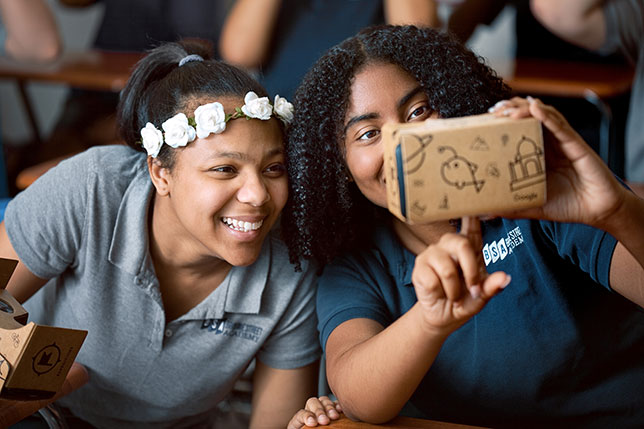Google Expeditions in Full Rollout, iOS Version to Follow

Google has formally rolled out the full release version of Google Expeditions, the company's virtual reality system for education that's built on top of Google Cardboard. Cardboard itself is designed to take the edge off the generally high cost of VR by allowing students to use common mobile devices in conjunction with a relatively inexpensive cardboard frame to experience VR.
The move comes after about nine months of pre-release testing in which, according to Google, more than 1 million students in 11 countries participated in virtual field trips using the technology.
According to Google, as of today, the Expeditions app is available to everyone on Android devices. Notably, the company said, an iOS version — for iPads and iPhones — is expected to follow. (Google did not give a timeframe for the iOS release.)
"Today, we're making Expeditions available to everyone," according to a Google spokesperson. "To get started, all teachers need to do is download the Expeditions app onto a set of devices and choose which one of the over 200 Expeditions they want to take their class on."
In related news, Best Buy Education is launching Google Expedition kits for schools, which include a tablet, VR viewers and a router. Kits are available now. According to Google, they'll ship in time for back to school. Google is also make specs available for other partners that might want to create Expeditions kits.
Ben Schrom, product manager Google Expeditions, noted in a press conference announcing the formal launch of Expeditions that schools are limited in providing some types of experiential learning to students — experiences that might be too far away, too expensive or even too dangerous but that might otherwise be beneficial to students' learning and understanding of material. "We think VR is a chance ... to make at least bite-sized moments of experiential learning a much, much more regular occurrence at schools," he said.
Google Expeditions is in full rollout and can be downloaded free for Android now. The iOS version will follow. Google is exhibiting in the ISTE conference in booth 2511.
Google also announced a new technology called Google Cast for sharing a classroom projector, as well as a new Quiz feature for Google Apps.